The Intel Skylake-X Review: Core i9 7900X, i7 7820X and i7 7800X Tested
by Ian Cutress on June 19, 2017 9:01 AM ESTBenchmarking Performance: CPU Office Tests
The office programs we use for benchmarking aren't specific programs per-se, but industry standard tests that hold weight with professionals. The goal of these tests is to use an array of software and techniques that a typical office user might encounter, such as video conferencing, document editing, architectural modelling, and so on and so forth.
Chromium Compile (v56)
Our new compilation test uses Windows 10 Pro, VS Community 2015.3 with the Win10 SDK to combile a nightly build of Chromium. We've fixed the test for a build in late March 2017, and we run a fresh full compile in our test. Compilation is the typical example given of a variable threaded workload - some of the compile and linking is linear, whereas other parts are multithreaded.
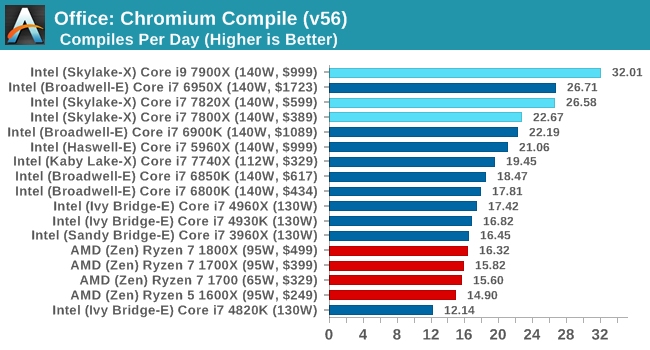
PCMark8
Despite originally coming out in 2008/2009, Futuremark has maintained PCMark8 to remain relevant in 2017. On the scale of complicated tasks, PCMark focuses more on the low-to-mid range of professional workloads, making it a good indicator for what people consider 'office' work. We run the benchmark from the commandline in 'conventional' mode, meaning C++ over OpenCL, to remove the graphics card from the equation and focus purely on the CPU. PCMark8 offers Home, Work and Creative workloads, with some software tests shared and others unique to each benchmark set.
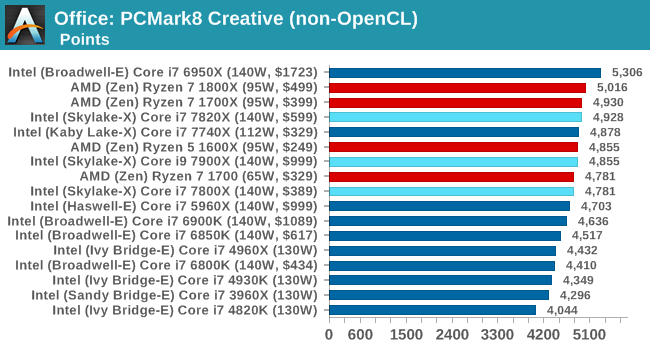
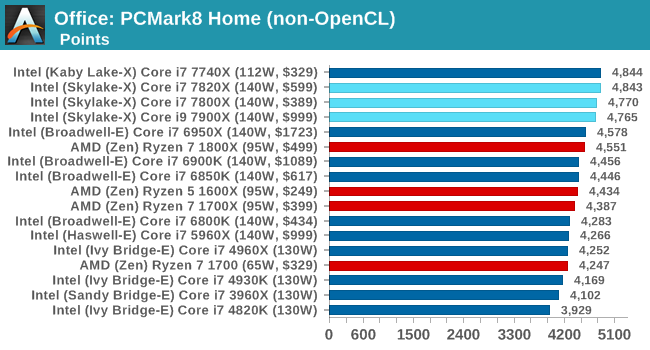
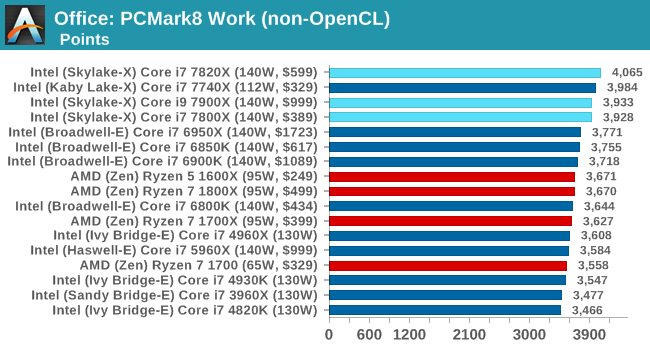
SYSmark 2014 SE
SYSmark is developed by Bapco, a consortium of industry CPU companies. The goal of SYSmark is to take stripped down versions of popular software, such as Photoshop and Onenote, and measure how long it takes to process certain tasks within that software. The end result is a score for each of the three segments (Office, Media, Data) as well as an overall score. Here a reference system (Core i3-6100, 4GB DDR3, 256GB SSD, Integrated HD 530 graphics) is used to provide a baseline score of 1000 in each test.
A note on context for these numbers. AMD left Bapco in the last two years, due to differences of opinion on how the benchmarking suites were chosen and AMD believed the tests are angled towards Intel processors and had optimizations to show bigger differences than what AMD felt was present. The following benchmarks are provided as data, but the conflict of opinion between the two companies on the validity of the benchmark is provided as context for the following numbers.
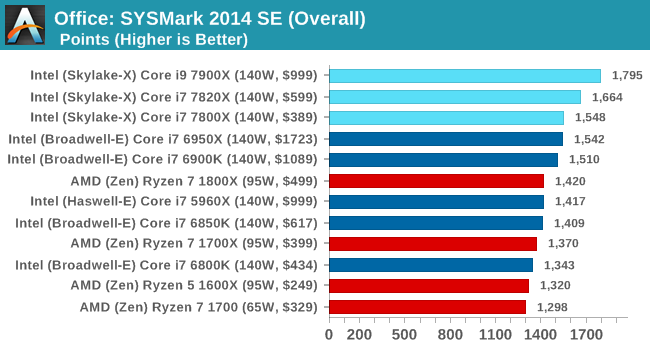










264 Comments
View All Comments
Gastec - Sunday, August 20, 2017 - link
The Ryzen 1600X has the same theoretical frequencies as 1800X (on paper) minus 2 cores. Both Ryzen 1700X and 1700 have lower frequencies than 1600X. As to why the 1600X shows slightly better results than 1800X in some single-core tests it's probably due to a combination of lower power consumption(less heat) XFR and binning.Read this: http://www.anandtech.com/show/11244/the-amd-ryzen-...
dstephens80 - Monday, August 14, 2017 - link
All, I have come across something interesting and wondering if it is only me. I just received my 7820x and was playing around with overclocking and I have to question Intel's claim that the CPUs are "Fully Unlocked". Using an Asus Strix-E X299 MB I adjusted my overclock to 4.6Ghz and then booted successfully and started my stress testing. I noticed my clock speed was bouncing between 4.3 and 4.6 so I thought maybe speedstep was interfering and went into BIOS and turned off SpeedStep, TurboBoost and C-states. When I booted back up I received an error for the TurboBoost utility (expected) but my speed was at the stock 3.6Ghz and the Intel Extreme Utility showed the same but also showed my multiplier should be set at 46. I went back into BIOS and enabled "TurboBoost" and upon reboot CPUz/Intel utility both showed speed at 4.6Ghz. My issue with the "Fully Unlocked" claim is that an OC should not be dependent on a software driver. I have confimed this by the fact that when I boot Linux the OC is not applied.leeymcj - Sunday, September 3, 2017 - link
I have a question, so all the cores are equipped with dedicated AVX register? (cost ~15% of area for each of them)gogi95 - Wednesday, September 27, 2017 - link
what is replacement algorithm used in Intel core i9?